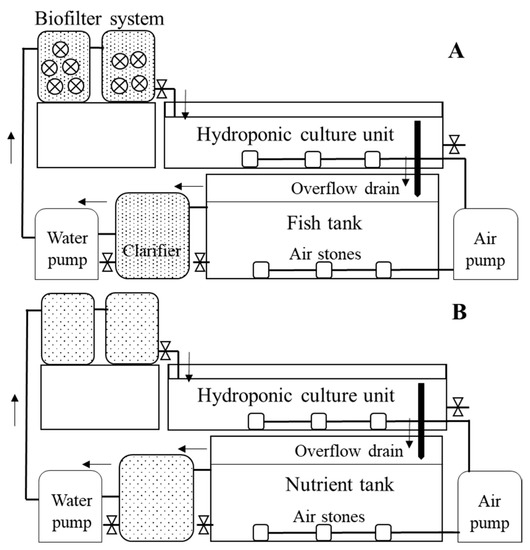Proponents of hydroponic and aquaponic systems suggest their growing methods would reduce or eliminate any risk of contamination. However, food safety concerns have been raised over vegetables and herbs grown in aquaponics and hydroponics systems. The concerns relate to the reuse of wastewater and spent nutrients. A Purdue University study has found the presence of Shiga toxin-producing E. coli (STEC) in hydroponic and aquaponic growing systems. STEC was found in fish feces in the water of both aquaponics and hydroponics. It was also found on the surface of the roots of lettuce, basil, and tomato regardless of the system. Importantly, contaminated water did not lead to the internalization of STEC into the roots, leaves, and/or fruit of the plants. Listeria monocytogenes and Salmonella spp. were not present in any samples examined. Fish feces were considered the primary source of the pathogenic bacteria in the aquaponic system, possibly due to the introduction of contaminated fish. @ https://www.mdpi.com/2311-7524/6/1/1/htm
The Occurrence of STEC in Aquaponic and Hydroponic systems
Food safety concerns have been raised over vegetables and herbs grown in aquaponics and hydroponics due to the reuse of wastewater and spent nutrient solutions. This study was conducted to determine the occurrence of foodborne pathogens in greenhouse-based aquaponic and hydroponic systems. Fish feces, recirculating water, roots, and the edible portions of lettuce, basil, and tomato were collected at harvest, and microbiological analyses were conducted for the bacterial pathogens Shiga toxin-producing Escherichia coli (STEC), Listeria monocytogenes, and Salmonella spp. Enrichments and selective media were used for the isolation, and presumptive positive colonies were confirmed by PCR. STEC was found in fish feces, in the water of both systems, and on the surface of the roots of lettuce, basil, and tomato regardless of the system. However, contaminated water did not lead to the internalization of STEC into the roots, leaves, and/or fruit of the plants. Meanwhile, L. monocytogenes and Salmonella spp. were not present in any samples examined. Our results demonstrated that there are potential food safety hazards for fresh produce grown in aquaponic and hydroponic production systems.

